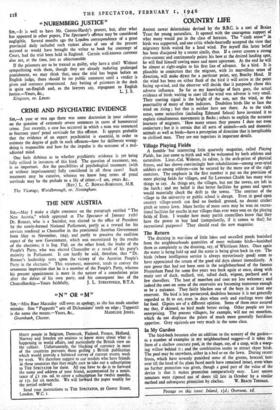The Return
The draining in war-time of little lakes and so-called ponds banished from the neighbourhoods quantities of most welcome birds—banished them as completely as the draining, say, of Whittlesee Mere. Once again the water is being held up and the scene is being given back its eye. The birds (whose intelligence service is always mysteriously good) seem to have appreciated the return of the good old days almost immediately. A rare goose that had not been seen in the neightbourhood of the famous Freynsham Pond for some five years was back again at once, along with many sort of duck, mallard, teal, tufted duck, wigeon, pochard and a few shovelers. The host of moorhen and coot are less welcome ; and indeed the coot on some of the reservoirs are becoming numerous enough to be a nuisance. They fairly blacken one of the bays in at least one reservoir. No bird is less persecuted, doubtless because it is not generally regarded as fit to eat, even in days when owls and starlings were shot for food. Gipsies are of a different opinion. Some of them once assured me that, if skinned, no bird made better eating. Other people are less enterprising. The poorest villagers, for example, will not eat moorhen, which do not displease the palate of much more generally fastidious appetites. Grey squirrels are very much in the same class.


























 Previous page
Previous page